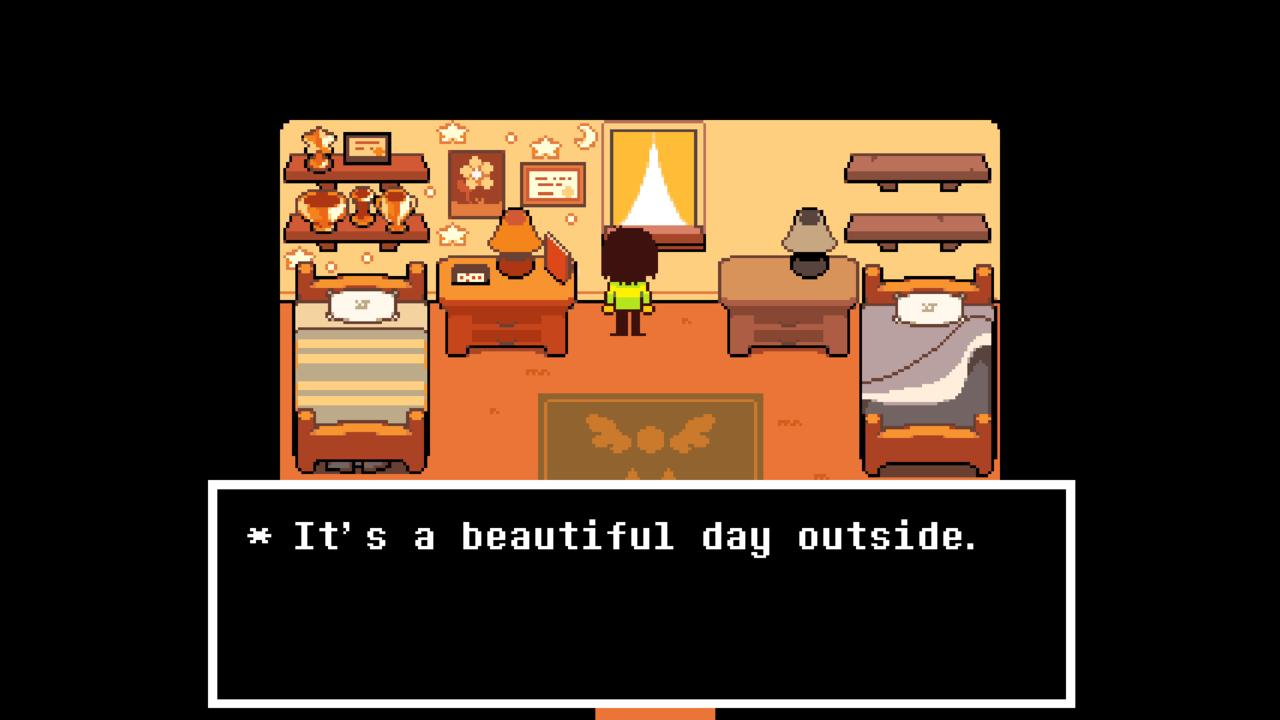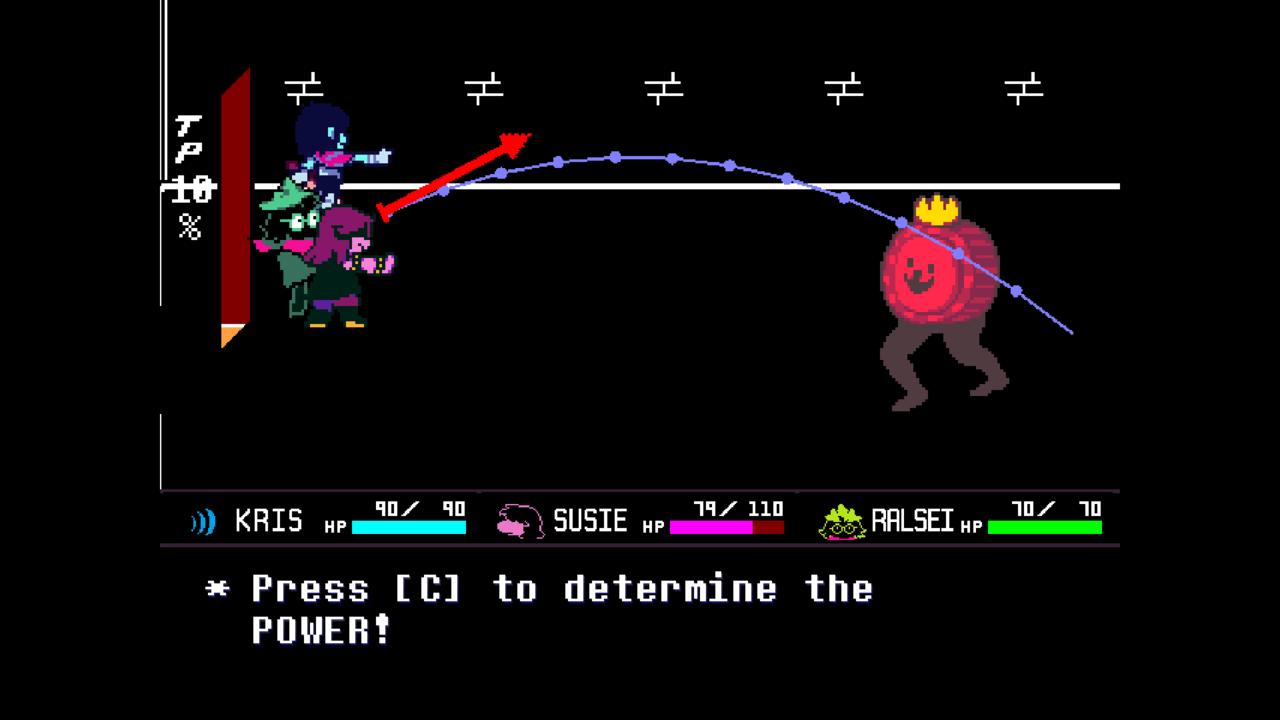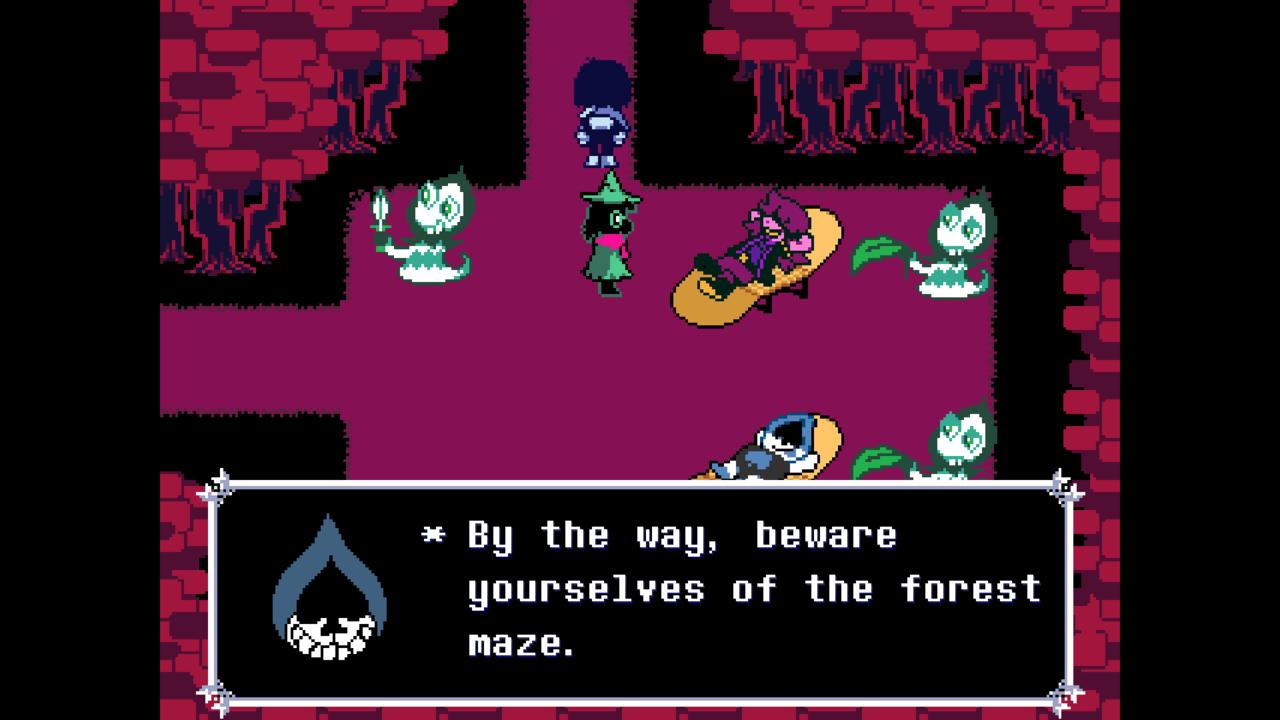Editor's Note: Light spoilers will follow in the text below. If you wish to play Undertale or Deltarune yourself before any impressions, please do. Story specifics and detailed theories are not discussed in this article.
I came to terms with the possibility that Undertale would solely exist as its own contained experience--the time spent in that world may have been enough even for those who are strongly invested in it. Granted, many of the deeper story threads led to ambiguous ends, but even that ambiguity could live on its own. However, that world has been reopened with Deltarune; a surprise release, part of an episodic retro-style RPG that uses much of the foundation from Undertale. Chapter 1 is available for free, and while it only touches on its best new mechanics and leaves us with more questions than answers, Deltarune shows promise for living up to monumental expectations.
Deltarune presents itself as a variation on many of the same fundamentals and themes from Undertale, as if it exists as a parallel. After an eerie introduction that seems like a throwaway nightmare state, you'll recognize familiar faces. Toriel wakes you up and takes you to school, and you see Undyne as a police officer, Alphys as your teacher, and Temmie as a classmate, among others. All monsters living normal lives on the surface. You'll probably also see a stark resemblance in Kris, the game's protagonist, as well. Events proceed rather smoothly until the plot thickens with the introduction of a new character, Susie, who appears to be the class bully. As you reluctantly follow Susie to get Alphys' blackboard chalk, a mysterious descent into an underworld soon occurs within the school's supply closet.

Not long afterward, Deltarune introduces you to how it takes Undertale's fundamentals a step further. While navigating the environment, rooms themselves occasionally become hostile, forcing you to avoid obstacles in the same vein as the defense-phase bullet-hell in combat. Player perspective has also changed in combat from facing enemies head-on (like Earthbound) to a side-view of the battlefield (like NES/SNES Final Fantasy). Random encounters have been removed in favor of making all your potential enemies visible within the environment, which better manages the game's flow.
Like Undertale, there's an earnestness to the game's society of monsters that appear to lead peaceful lives. More often than not, you'll be smiling ear-to-ear from the witty writing, snappy jokes, and absurdist humor by good-natured characters.
No one has to get hurt, similar to Undertale. Through ACT, you can talk your way out of battles and SPARE enemies with the right sequence of dialogue options. There's still the FIGHT option where input timing dictates the damage dealt, but MAGIC opens up new options for attacking and healing; the system of TP is a sensible way to incorporate its own take on mana. And of course, enemy turns have you moving your heart (or SOUL) to dodge their unpredictable attacks. It remains an innovative system that leaves room for each battle to break convention and let the game's personality flourish, especially now that you have party members. Depending on the situation, you'll have opportunities for clever team actions; commanding Ralsei to sing puts enemies to sleep and the ability to pacify them without harm. There's nothing quite like the K.Round boss fight that has you setting the trajectory for Susie to launch Ralsei into the enemy's crown to knock it off its head. Or carefully rearranging Bloxer's body to cheer it up and send it on its merry way before it can hurt your team.
The shift in perspective affords the opportunity to see Kris and their allies shine, too. Wonderfully animated pixel art accompanies each action--the best examples being when Ralsei pulls up his scarf to cover himself for a DEFEND command, or how he gives adorable little claps when fights end. Despite the games pseudo-8-bit/16-bit style, character expressions and body language provide vivid displays of personality. The ability to communicate so much with so little is one of Undertale's greatest accomplishments, and Deltarune achieves this as well.

Core mechanics are in service of building a unique brand of quirky charm. But arguably, the most important piece of the puzzle is the soundtrack. Toby Fox samples his own music from Undertale in both subtle and overt ways to great effect, almost like callbacks to remind you that these two worlds are somehow bound together. As soon as "Field Of Hopes And Dreams" starts, you feel a percussive momentum complemented by a bold, catchy rhythm and piano lead. And memories of Snowdin Town begin to sink in when the melody transitions, as if to empower you with a sense of familiarity to explore uncharted territory. This extends to "Scarlet Forest," another standout track that sounds like it's performed by a full orchestra, with a staccato rhythm and marching drums that support a layered string section and whimsical woodwinds. It's an evocative score that seamlessly blends of the old and new using wonderful instrumentation.
As soon as "Field Of Hopes And Dreams" starts, you feel a percussive momentum complemented by a bold, catchy rhythm and piano lead. And memories of Snowdin Town begin to sink in when the melody transitions, as if to empower you with a sense of familiarity to explore uncharted territory.
Like Undertale, there's an earnestness to the game's society of monsters that appear to lead peaceful lives. More often than not, you'll be smiling ear-to-ear from the witty writing, snappy jokes, and absurdist humor from good-natured characters. Even knuckleheads like Lancer and Susie come around. But another of Deltarune's unique strengths is how it leverages its charm to create deeply unsettling atmospheres and implications. This paves the way for the possible impact of darker undertones, further driven by meta-narrative elements. You can't shake the feeling that something's amiss when you start to string together the ways these games might be connected. Beneath the uplifting joy and comfort that you'll see on Deltarune's surface, you get the sense that there's a bigger, more sinister picture, given what we know about Undertale and the events that unfold in Chapter 1. That could also just be the theorycrafting speaking.

In many ways, Deltarune does feel like a prototype--Toby Fox has said as much, and also commented on the challenge of building the game with limited resources. Some sequences are a bit barebones, such as the checkered hallway that's a linear path with a simple timing puzzle, and the Card Castle that's a series monochromatic rooms (though it does feature some top-tier gags). Most of all, the best parts of the short journey are over before they can fully flesh themselves out. However, the weaving of music, dialogue, visual presentation, along with the foundation set by Undertale, there's reason to believe that Deltarune will make good on returning to the lore and putting new spins on familiar themes.
I’m beyond ecstatic that Deltarune even exists. While I wish there were more opportunities to engage in its best features, I constantly remind myself that this is the first chapter.
Its connections to Undertale are often on the nose, but I suspect that this has a purpose. I get the impression that the moments of fan-service, clear callbacks, and apparent parallels are deliberate, as if they'll lead to less obvious revelations. I'm also curious as to how the future of Deltarune handles the fact we kind of expect the game to mess with us and subvert our expectations; thankfully, it's off to a great start.
I’m beyond ecstatic that Deltarune even exists. While I wish there were more opportunities to engage in its best features, I constantly remind myself that this is the first chapter. There's no telling where the subsequent chapters will lead, but it's incredibly exciting to know that this isn't the end.





















